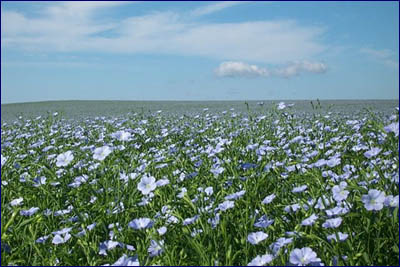| |
Flax Seed (Linum usitatissimum, Linseed)
 |
Some call it one of the most powerful plant foods on
the planet. There’s some evidence it can help reduce your risk of heart disease,
cancer, stroke, and diabetes. That’s quite a tall order for a tiny seed that’s
been around for centuries: flaxseed.
Flaxseed was
cultivated in Babylon as early as 3000 BC, according to the Flax Council of
Canada. By the 8th century, King Charlemagne believed so strongly in the health
benefits of flaxseed that he passed laws requiring his subjects to consume it.
Fast-forward 13 centuries, and some experts would say we have preliminary
research to back up what Charlemagne suspected all those years ago.
These days, flaxseed is found in all kinds of foods,
from crackers to frozen waffles to oatmeal. In the first 11 months of 2006, 75
new products were launched that listed flax or flaxseed as an ingredient. Not
only has consumer demand for flaxseed gone up, agricultural use has also
increased -- to feed all those chickens laying eggs that are higher in omega-3
fatty acids.
Although flaxseed
contains all sorts of healthy components, it owes its healthy reputation
primarily to three ingredients:
Omega-3 essential
fatty acids, "good" fats that have been shown to have heart-healthy effects.
Each tablespoon of ground flaxseed contains about 1.8 grams of plant omega-3s.
Lignans,
which have both plant estrogen and antioxidant qualities. Flaxseed contains 75-
800 times more lignans than other plant foods
Fiber. Flaxseed
contains both the soluble and insoluble types.
FLAX SEED OIL.
Virgin Flax Seed Oil is rich in essential fatty acids primarily the omega 3 fatty acid ALA (α-linolenic acid C18:3n-3) which is typically present at a level of 40%-65%. After extracting the oil from the seed of the Flax plant, the oil is filtered resulting in a golden colored oil with a characteristic odor and taste.
Virgin, cold-pressed Flax seed oil nurishes, moisturizes, smoothes, and firms the skin. Virgin, cold-pressed Flax seed oil is a nourishing addition to formulations intended to help treat eczema, psoriasis, rosacea, acne and aging skin. Flaxseed Oil is incredibly rich in the essential fatty acids known as Omega-3, (alpha linolenic acid), and Omega-6 (linoleic acid). Flaxseed oil helps nourish the skin membranes by supplying our skin with natural Omega-3 and Omega-6 fatty acids. Omega-3 fatty acids in Flaxseed oil in also essential for the production of prostaglandins in the skin to help reduce inflammation and promote healing of the skin. Flaxseed oil, when used topically, can be immensely soothing to a variety of conditions including sunburn. Flaxseed oil can also help seal moisture into the skin, making it a great ingredient to have in lotions.
Due to its anti-inflammatory omega-3 fatty acids, flax seed oil reduces red skin and irritation. Acne, psoriasis, rosacea and eczema can be improved by the use of the flax seed oil. The abundant omega-3 fatty acids in flaxseed oil have been shown to contribute to healthy hair growth (in fact, low levels of these acids may cause dry and lackluster locks). Hair problems exacerbated by psoriasis or eczema of the scalp may respond to the skin-revitalizing and anti-inflammatory actions of flaxseed oil as well. Similarly, the oil's EFAs work to nourish dry or brittle nails, stopping them from cracking or splitting.
The essential fatty acids in flaxseed oil are largely responsible for its skin-healing powers. Red, itchy patches of eczema, psoriasis and rosacea often respond to the EFA's anti-inflammatory actions and overall skin-soothing properties. Sunburned skin may heal faster when treated with the oil as well. In cases of acne, the EFAs encourage thinning of the oily sebum that clogs pores.
The essential fatty acids in flaxseed oil are one of its key healing components. EFAs are particularly valuable because the body needs them to function properly, but can't manufacture them on its own. Essential fatty acids work throughout the body to protect cell membranes, keeping them efficient at admitting healthy substances while barring damaging ones.
One of the EFAs in flaxseed oil, alpha-linolenic acid, is known as an omega-3 fatty acid. Like the omega-3s found in fish, it appears to reduce the risk of heart disease and numerous other ailments.
Flaxseed oil is an excellent source of omega-3s: Just 1 teaspoon contains about 2.5 grams, equivalent to more than twice the amount most people get through their diets. Flaxseeds also contain omega-6 fatty acids in the form of linoleic acid; omega-6s are the same healthy fats found in vegetable oils.
Whole flaxseeds are a rich source of lignans (phytoestrogens), substances that appear to positively affect hormone-related problems. Lignans may also be useful in preventing certain cancers and combating specific bacteria, fungi, and viruses, including those that cause cold sores and shingles.
A source of fiber for linen fabric since ancient times, the slender flax plant also boasts a long history as a healing herb. First cultivated in Europe, the plant's brown seeds were regularly used to prepare balms for inflamed skin and healing slurries for constipation. Today, flaxseeds (also called linseeds) are best known for the therapeutic oil that is derived by pressing them. Rich in essential fatty acids, or EFAs, flaxseed oil has earned a solid reputation for treating a range of ailments, from heart disease to lupus.
Disclaimer: The information presented herein is intended for educational
purposes only. These statements have not been evaluated by the FDA and are not
intended to diagnose, cure, treat or prevent disease. Individual results may
vary, and before using any supplements, it is always advisable to consult with
your own health care provider.
|
|


















